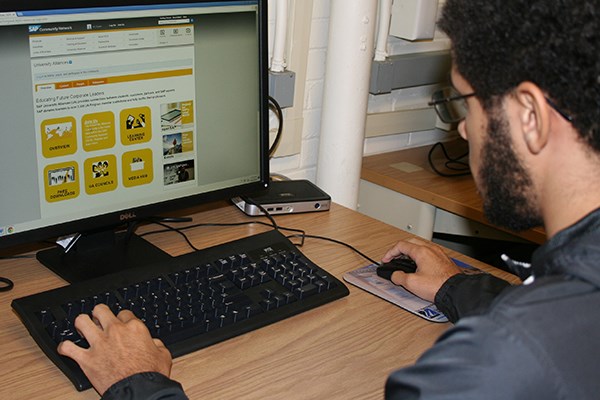New Program Provides Access to World-leading Business Software Platform

10/20/2015
By Ed Brennen
Students and faculty in the Manning School of Business will soon have access to the world’s most dominant business software platform, along with a global network of resources and curriculum, thanks to the school’s new membership in the SAP University Alliances Program.
SAP is a German company that makes enterprise software to manage business operations and customer relations for nearly 300,000 clients in 190 countries around the world — including 80 percent of Fortune 1000 companies.
The University Alliances Program, which includes more than 2,300 member institutions worldwide, will allow Manning School students from any program or discipline to use SAP software to apply theoretical concepts in real-world business cases.
“The SAP Alliance is an investment in our two most important cores: our students and our faculty," says Manning School interim dean Scott Latham. “By joining the SAP Alliance, we are not only furthering our commitment to preparing students for fulfilling, successful careers, we are also reinforcing our strengths in our world-class Operations and Information Systems (OIS) faculty.”
Prof. Luvai Motiwalla, OIS department chair, spearheaded the Manning School’s SAP Alliance application, which was approved in September. He and a half-dozen other faculty members are testing the software this semester, with plans to introduce it to students in the spring.
“We want our students to have hands-on experience with SAP software before they go out in the job market because that increases their marketability,” says Motiwalla, who is working with the MSB Advisory Board and Career Services & Cooperative Education Center to form an SAP Advisory Board composed of three to four local companies that use the software.
“They will guide us on SAP skills needed by our students, their expectations for internships and new hires, and provide assistance with our curriculum and other resources,” says Motiwalla, whose research in applying for the SAP Alliance underscored its importance in the local job market:
- There are 598 companies in the New England chapter of the Americas’ SAP User Group;
- A search on indeed.com for positions requiring “SAP skills” identified several major local SAP-user companies, including Raytheon, Philips, Pfizer, EMC and Biogen;
- On CareerLink, there were 54 jobs in the past year that include “SAP” as a required skillset;
- And on SimplyHired.com, there were 3,965 job postings in June 2015 that mentioned “SAP” within a 50-mile radius of the university, and nearly 80,000 job postings nationwide.
“There is a strong demand for SAP skills in our region,” Motiwalla says. “Becoming a member of the University Alliances Program will benefit both the SAP employer community and our students.”
As an SAP member, the Manning School will also be part of the University Alliances Community, which allows more than 8,000 professors and hundreds of thousands of students to download shared resources and exchange ideas. More than 250 U.S. colleges and universities belong to the SAP Alliance, including Bentley, Babson, Suffolk and UMass Amherst.
“The good thing about the Alliance is that you don’t have to reinvent the wheel,” Motiwalla says. “We can tap into other members’ expertise and use it in our courses.”
In a course like Accounting Information Systems, SAP software would replace QuickBooks, which is currently used to introduce students to a computer-based accounting information system. In a course like Human Resource Management, students can use the SAP’s HR module to set up and maintain organizational structures, personnel data, hiring processes, payroll, benefits and more.
“Our students are very good in theoretical, conceptual pieces of how disciplines like accounting or marketing work, but this will give them opportunities to practice some of the concepts for a better understanding,” says Motiwalla, who adds that any school or department across campus will have access the cloud-based SAP software, not just Manning School students.
The Manning School has funded the first-year membership fee of $8,000, but Motiwalla says the long-term goal is to have local SAP-user companies help cover annual costs. And while plans call for SAP software to be integrated into the Bachelor of Science in Business Administration program curriculum, Motiwalla says it’s likely to be added to graduate programs, as well.
“We will evaluate things year to year, but I think we will need a three-year period to really assess how we are doing,” says Motiwalla, who adds that the SAP software will figure prominently in the new Pulichino Tong Business Building finance lab.
“The key metric will be how students react in the classroom,” Motiwalla says, “and long-term how it helps recruiting efforts.”
